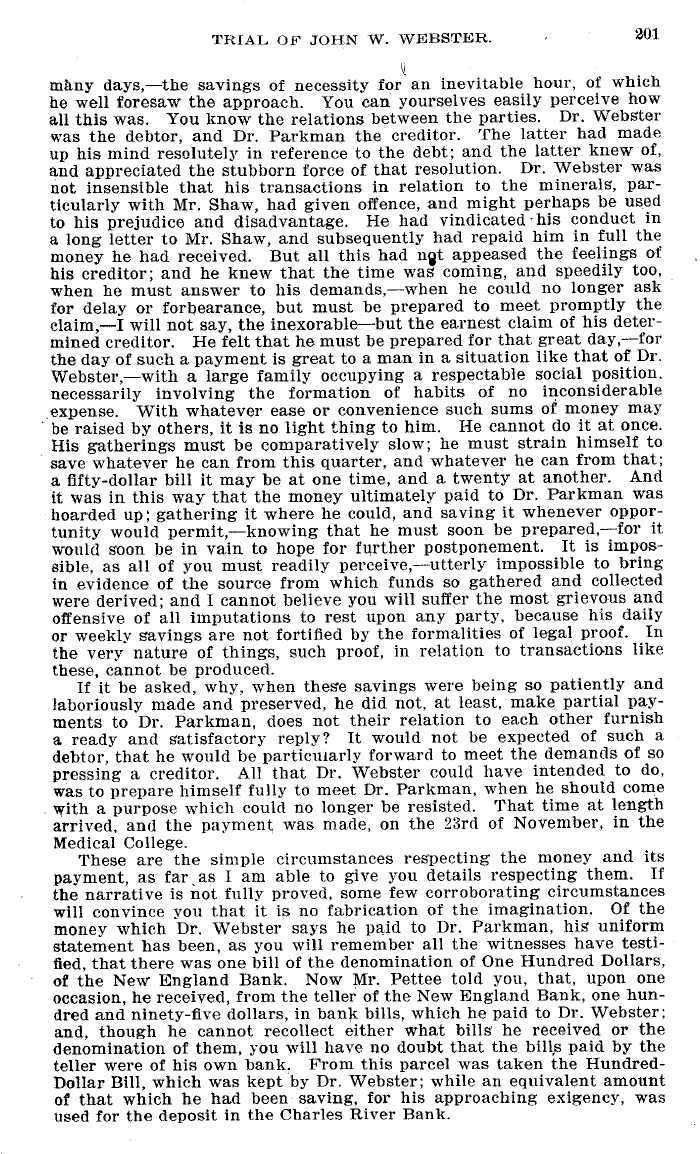|
TRIAL OF JOHN W. WEBSTER. 201
mhny days, the savings of necessity for an inevitable hour, of which
he well foresaw the approach. You can yourselves easily perceive how
all this was. You know the relations between the parties. Dr. Webster
was the debtor, and Dr. Parkman the creditor. The latter had made
up his mind resolutely in reference to the debt; and the latter knew of,
and appreciated the stubborn force of that resolution. Dr. Webster was
not insensible that his transactions in relation to the minerals, par-
ticularly with Mr. Shaw, had given offence, and might perhaps be used
to his prejudice and disadvantage. He had vindicated his conduct in
a long letter to Mr. Shaw, and subsequently had repaid him in full the
money he had received. But all this had nVt appeased the feelings of
his creditor; and he knew that the time was coming, and speedily too,
when he must answer to his demands,-when he could no longer ask
for delay or forbearance, but must be prepared to meet promptly the
claim,-I will not say, the inexorable-but the earnest claim of his deter-
mined creditor. He felt that he must be prepared for that great day,-for
the day of such a payment is great to a man in a situation like that of Dr.
Webster,-with a large family occupying a respectable social position.
necessarily involving the formation of habits of no inconsiderable
expense. With whatever ease or convenience such sums of money may
be raised by others, it is no light thing to him. He cannot do it at once.
His gatherings must be comparatively slow; he must strain himself to
save whatever he can from this quarter, and whatever he can from that;
a fifty-dollar bill it may be at one time, and a twenty at another. And
it was in this way that the money ultimately paid to Dr. Parkman was
hoarded up; gathering it where he could, and saving it whenever oppor-
tunity would permit,-knowing that he must soon be prepared,-for it,
would soon be in vain to hope for further postponement. It is impos-
sible, as all of you must readily perceive,-utterly impossible to bring
in evidence of the source from which funds so gathered and collected
were derived; and I cannot believe you will suffer the most grievous and
offensive of all imputations to rest upon any party, because his daily
or weekly savings are not fortified by the formalities of legal proof. In
the very nature of things, such proof, in relation to transactions like
these, cannot be produced.
If it be asked, why, when these savings were being so patiently and
laboriously made and preserved, he did not, at least, make partial pay-
ments to Dr. Parkman, does not their relation to each other furnish
a ready and satisfactory reply? It would not be expected of such a
debtor, that he would be particularly forward to meet the demands of so
pressing a creditor. All that Dr. Webster could have intended to do,
was to prepare himself fully to meet Dr. Parkman, when he should come
With a purpose which could no longer be resisted. That time at length
arrived, and the payment was made, on the 23rd of November, in the
Medical College.
These are the simple circumstances respecting the money and its
payment, as far as I am able to give you details respecting them. If
the narrative is not fully proved, some few corroborating circumstances
will convince you that it is no fabrication of the imagination. Of the
money which Dr. Webster says he paid to Dr. Parkman, his uniform
statement has been, as you will remember all the witnesses have testi-
fied, that there was one bill of the denomination of One Hundred Dollars,
of the New England Bank. Now Mr. Pettee told you, that, upon one
occasion, he received, from the teller of the New England Bank, one hun-
dred and ninety-five dollars, in bank bills, which he paid to Dr. Webster;
and, though he cannot recollect either what bills he received or the
denomination of them, you will have no doubt that the bills paid by the
teller were of his own bank. From this parcel was taken the Hundred-
Dollar Bill, which was kept by Dr. Webster; while an equivalent amount
of that which he had been saving, for his approaching exigency, was
used for the deposit in the Charles River Bank.
|

